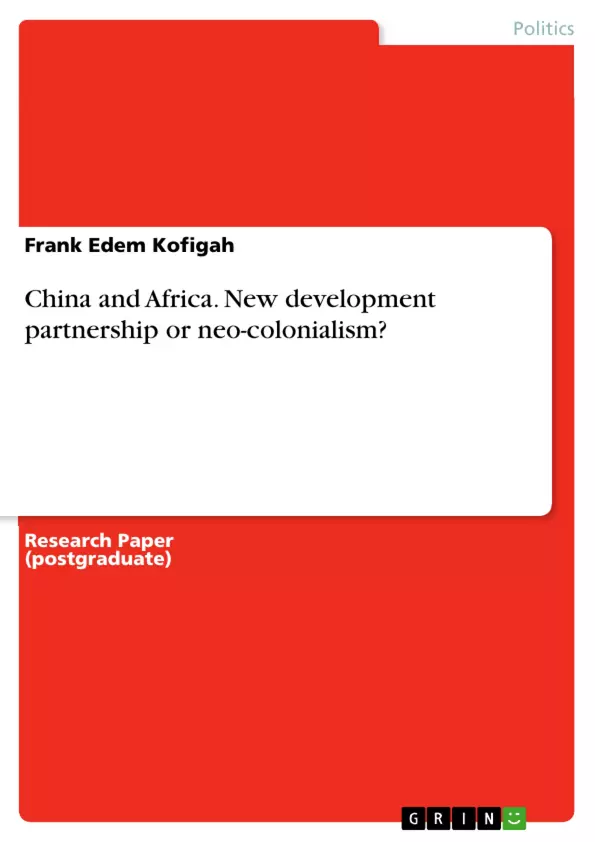In the wake of its emergence unto the international scene, the Chinese State (development-centered and seemingly strategic) has, in recent times, increasingly resorted to building ties with major countries on the African continent, hence, the increment in its visits to the latter. Politically, but in recent times, economically motivated, the underlying factors behind these visits are in contrast to the nature of the ties once shared. Indeed, in times past, especially from the 80's onwards, China-Africa relations have moved from political interests to now center on commercial and financial ones. But, what really explains the growing interest of China in Africa? This is the core issue this article seeks to tackle. In response, this paper has been divided into two parts. The first part focuses on the main reasons behind China's foray into Africa while the second focuses on the impact of the Chinese presence on the continent's development efforts.
Inhaltsverzeichnis (Table of Contents)
- Introduction
- I. China-Africa trade: source of economic boom.
- II. The impact of China's presence in Africa: the rise of neo-colonialism?
Zielsetzung und Themenschwerpunkte (Objectives and Key Themes)
This paper analyzes the growing economic ties between China and Africa, examining the reasons behind China's increasing interest in the continent and exploring the impact of its presence on Africa's development efforts.
- China's economic rise and its search for strategic resources.
- The expanding trade relationship between China and Africa.
- The potential for neo-colonialism in China-Africa relations.
- The impact of Chinese investment on African development.
- The implications of China's growing influence for the future of Africa.
Zusammenfassung der Kapitel (Chapter Summaries)
The introduction explores the shift in global economic power from West to East and the emergence of China as a major player on the international stage. It highlights China's economic growth and its growing need for strategic resources, particularly in the mining and energy sectors.
Chapter I focuses on the booming trade between China and Africa, highlighting the role of the China-Africa Cooperation forums and the dramatic increase in trade volume between the two regions. The chapter includes a statistical analysis of trade patterns and explores the significance of the growing economic relationship.
Chapter II delves into the implications of China's presence in Africa, examining the potential for neo-colonialism and its impact on African development. It explores the arguments for and against the characterization of China-Africa relations as neo-colonialist and examines the role of Chinese investment in the continent.
Schlüsselwörter (Keywords)
The key themes and concepts explored in this paper include China-Africa relations, trade, investment, development, neo-colonialism, strategic resources, economic growth, and South-South cooperation.
Frequently Asked Questions
What is the main focus of the China-Africa partnership study?
The study analyzes the growing economic and political ties between China and Africa, specifically exploring whether this relationship represents a new development partnership or a form of neo-colonialism.
How has the relationship between China and Africa changed since the 1980s?
Relations have shifted from being primarily driven by political interests to centering on commercial and financial interests, fueled by China's need for strategic resources.
What are the reasons for China's increasing interest in Africa?
The primary reasons include China's search for strategic resources (mining and energy) to fuel its economic rise and the expansion of trade opportunities through forums like the China-Africa Cooperation.
What is the impact of Chinese presence on African development?
The impact is dual-natured: it has triggered an economic boom and infrastructure investment, but also raised concerns about neo-colonialism and long-term implications for African sovereignty.
Does the paper address the concept of South-South cooperation?
Yes, the paper explores the relationship within the context of South-South cooperation and the shifting global economic power from West to East.
- Quote paper
- Frank Edem Kofigah (Author), 2014, China and Africa. New development partnership or neo-colonialism?, Munich, GRIN Verlag, https://www.grin.com/document/284836



